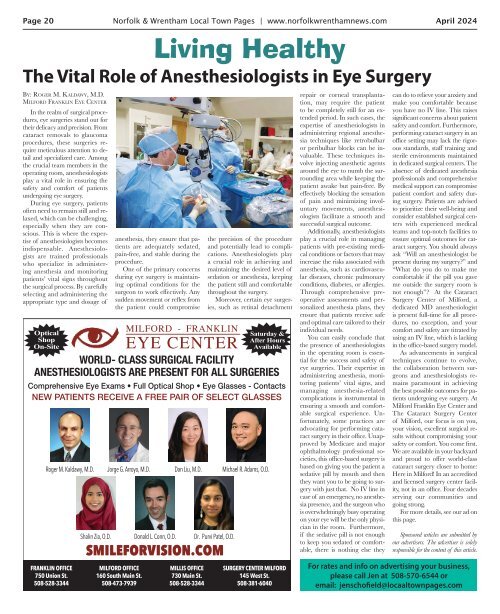You also want an ePaper? Increase the reach of your titles
YUMPU automatically turns print PDFs into web optimized ePapers that Google loves.
Page 20 <strong>Norfolk</strong> & <strong>Wrentham</strong> Local Town Pages | www.norfolkwrenthamnews.com <strong>April</strong> <strong>2024</strong><br />
Living Healthy<br />
The Vital Role of Anesthesiologists in Eye Surgery<br />
By: Roger M. Kaldawy, M.D.<br />
Milford Franklin Eye Center<br />
In the realm of surgical procedures,<br />
eye surgeries stand out for<br />
their delicacy and precision. From<br />
cataract removals to glaucoma<br />
procedures, these surgeries require<br />
meticulous attention to detail<br />
and specialized care. Among<br />
the crucial team members in the<br />
operating room, anesthesiologists<br />
play a vital role in ensuring the<br />
safety and comfort of patients<br />
undergoing eye surgery.<br />
During eye surgery, patients<br />
often need to remain still and relaxed,<br />
which can be challenging,<br />
especially when they are conscious.<br />
This is where the expertise<br />
of anesthesiologists becomes<br />
indispensable. Anesthesiologists<br />
are trained professionals<br />
who specialize in administering<br />
anesthesia and monitoring<br />
patients’ vital signs throughout<br />
the surgical process. By carefully<br />
selecting and administering the<br />
appropriate type and dosage of<br />
Optical<br />
Shop<br />
On-Site<br />
anesthesia, they ensure that patients<br />
are adequately sedated,<br />
pain-free, and stable during the<br />
procedure.<br />
One of the primary concerns<br />
during eye surgery is maintaining<br />
optimal conditions for the<br />
surgeon to work effectively. Any<br />
sudden movement or reflex from<br />
the patient could compromise<br />
MILFORD - FRANKLIN<br />
EYE CENTER<br />
the precision of the procedure<br />
and potentially lead to complications.<br />
Anesthesiologists play<br />
a crucial role in achieving and<br />
maintaining the desired level of<br />
sedation or anesthesia, keeping<br />
the patient still and comfortable<br />
throughout the surgery.<br />
Moreover, certain eye surgeries,<br />
such as retinal detachment<br />
Saturday &<br />
After Hours<br />
Available<br />
WORLD- CLASS SURGICAL FACILITY<br />
ANESTHESIOLOGISTS ARE PRESENT FOR ALL SURGERIES<br />
Comprehensive Eye Exams • Full Optical Shop • Eye Glasses - Contacts<br />
NEW PATIENTS RECEIVE A FREE PAIR OF SELECT GLASSES<br />
Roger M. Kaldawy, M.D. Jorge G. Arroyo, M.D. Dan Liu, M.D.<br />
FRANKLIN OFFICE<br />
750 Union St.<br />
508-528-3344<br />
Shalin Zia, O.D.<br />
SMILEFORVISION.COM<br />
MILFORD OFFICE<br />
160 South Main St.<br />
508-473-7939<br />
Donald L. Conn, O.D.<br />
MILLIS OFFICE<br />
730 Main St.<br />
508-528-3344<br />
Dr. Purvi Patel, O.D.<br />
Michael R. Adams, O.D.<br />
SURGERY CENTER MILFORD<br />
145 West St.<br />
508-381-6040<br />
repair or corneal transplantation,<br />
may require the patient<br />
to be completely still for an extended<br />
period. In such cases, the<br />
expertise of anesthesiologists in<br />
administering regional anesthesia<br />
techniques like retrobulbar<br />
or peribulbar blocks can be invaluable.<br />
These techniques involve<br />
injecting anesthetic agents<br />
around the eye to numb the surrounding<br />
area while keeping the<br />
patient awake but pain-free. By<br />
effectively blocking the sensation<br />
of pain and minimizing involuntary<br />
movements, anesthesiologists<br />
facilitate a smooth and<br />
successful surgical outcome.<br />
Additionally, anesthesiologists<br />
play a crucial role in managing<br />
patients with pre-existing medical<br />
conditions or factors that may<br />
increase the risks associated with<br />
anesthesia, such as cardiovascular<br />
diseases, chronic pulmonary<br />
conditions, diabetes, or allergies.<br />
Through comprehensive preoperative<br />
assessments and personalized<br />
anesthesia plans, they<br />
ensure that patients receive safe<br />
and optimal care tailored to their<br />
individual needs.<br />
You can easily conclude that<br />
the presence of anesthesiologists<br />
in the operating room is essential<br />
for the success and safety of<br />
eye surgeries. Their expertise in<br />
administering anesthesia, monitoring<br />
patients’ vital signs, and<br />
managing anesthesia-related<br />
complications is instrumental in<br />
ensuring a smooth and comfortable<br />
surgical experience. Unfortunately,<br />
some practices are<br />
advocating for performing cataract<br />
surgery in their office. Unapproved<br />
by Medicare and major<br />
ophthalmology professional societies,<br />
this office-based surgery is<br />
based on giving you the patient a<br />
sedative pill by mouth and then<br />
they want you to be going to surgery<br />
with just that. No IV line in<br />
case of an emergency, no anesthesia<br />
presence, and the surgeon who<br />
is overwhelmingly busy operating<br />
on your eye will be the only physician<br />
in the room. Furthermore,<br />
if the sedative pill is not enough<br />
to keep you sedated or comfortable,<br />
there is nothing else they<br />
can do to relieve your anxiety and<br />
make you comfortable because<br />
you have no IV line. This raises<br />
significant concerns about patient<br />
safety and comfort. Furthermore,<br />
performing cataract surgery in an<br />
office setting may lack the rigorous<br />
standards, staff training and<br />
sterile environments maintained<br />
in dedicated surgical centers. The<br />
absence of dedicated anesthesia<br />
professionals and comprehensive<br />
medical support can compromise<br />
patient comfort and safety during<br />
surgery. Patients are advised<br />
to prioritize their well-being and<br />
consider established surgical centers<br />
with experienced medical<br />
teams and top-notch facilities to<br />
ensure optimal outcomes for cataract<br />
surgery. You should always<br />
ask “Will an anesthesiologist be<br />
present during my surgery?” and<br />
“What do you do to make me<br />
comfortable if the pill you gave<br />
me outside the surgery room is<br />
not enough”? At the Cataract<br />
Surgery Center of Milford, a<br />
dedicated MD anesthesiologist<br />
is present full-time for all procedures,<br />
no exception, and your<br />
comfort and safety are titrated by<br />
using an IV line, which is lacking<br />
in the office-based surgery model.<br />
As advancements in surgical<br />
techniques continue to evolve,<br />
the collaboration between surgeons<br />
and anesthesiologists remains<br />
paramount in achieving<br />
the best possible outcomes for patients<br />
undergoing eye surgery. At<br />
Milford Franklin Eye Center and<br />
The Cataract Surgery Center<br />
of Milford, our focus is on you,<br />
your vision, excellent surgical results<br />
without compromising your<br />
safety or comfort. You come first.<br />
We are available in your backyard<br />
and proud to offer world-class<br />
cataract surgery closer to home:<br />
Here in Milford! In an accredited<br />
and licensed surgery center facility,<br />
not in an office. Four decades<br />
serving our communities and<br />
going strong.<br />
For more details, see our ad on<br />
this page.<br />
Sponsored articles are submitted by<br />
our advertisers. The advertiser is solely<br />
responsible for the content of this article.<br />
For rates and info on advertising your business,<br />
please call Jen at 508-570-6544 or<br />
email: jenschofield@locaaltownpages.com

















